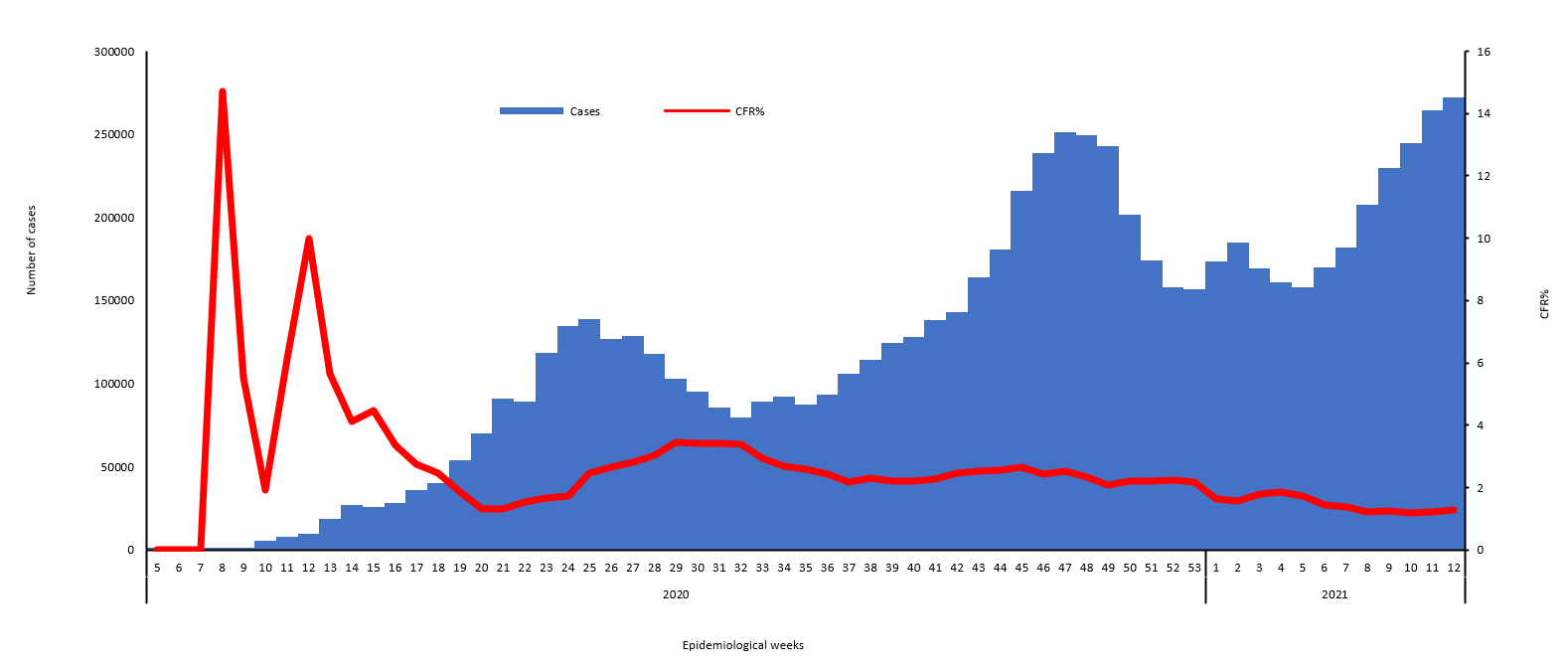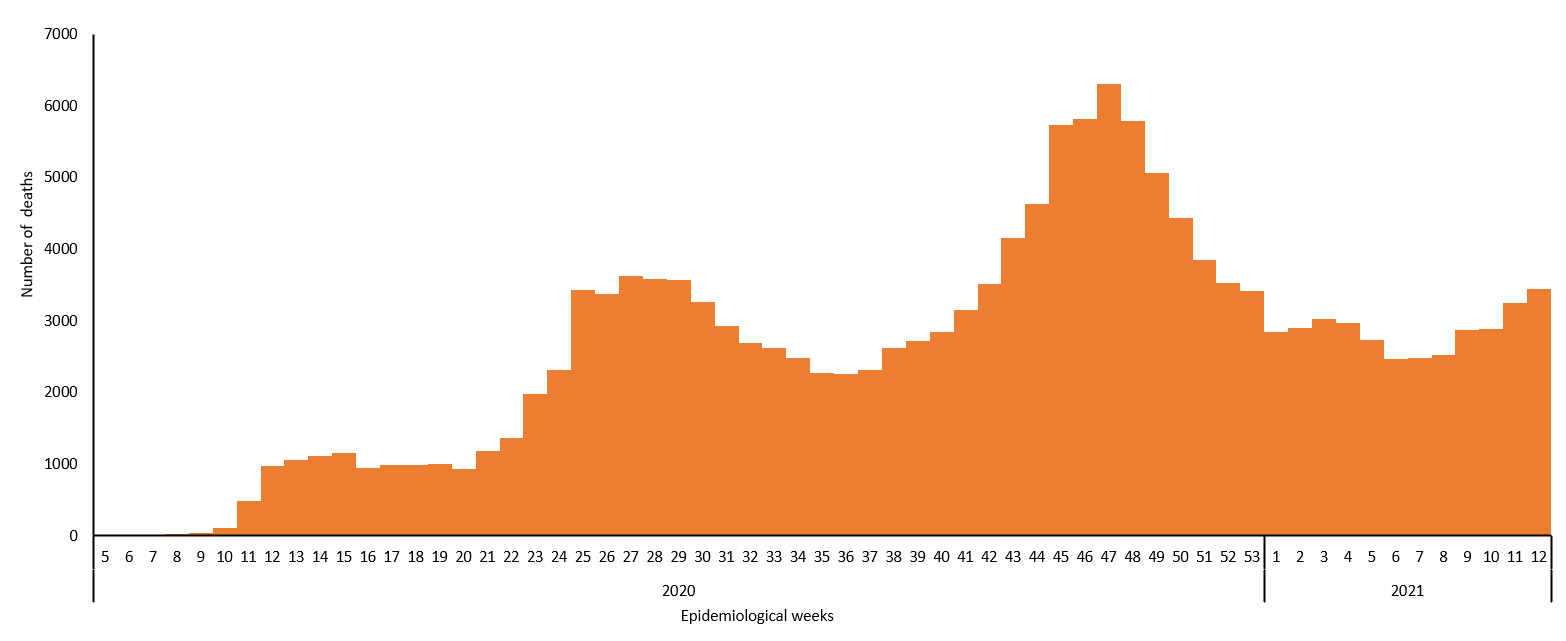The coronavirus disease COVID-19 continues to spread at the regional and global levels. As of 27 March 2021, the global cumulative incidence reached 125 796 996 reported cases and 2 759 502 associated deaths with a case fatality ratio (CFR) of 2.2%. Meanwhile, the 22 countries of the Eastern Mediterranean Region (EMR) have reported a total of 7 401 475 cases, which represent about 5.9% of the global count, with 156 996 associated deaths (CFR 2.1%). Most countries in the Region are in the community transmission phase.
Since the beginning of the outbreak, the country that has reported the highest number of total cases in the Region is Islamic Republic of Iran (1 846 923 cases; 25% of the Region’s total), followed by Iraq (827 157; 11.2%) and Pakistan (654 591; 8.8%). Islamic Republic of Iran also reported the highest number of total associated deaths (62 308; CFR 3.4%) followed by Pakistan (14 215; CFR 2.2%) and Iraq (14 177; CFR 1.7%). The highest CFRs were reported by Yemen (21%) followed by Syrian Arab Republic (6.7%), while the lowest CFRs were reported by Qatar (0.2%) followed by United Arab Emirates (0.3%) and Bahrain (0.4%).
During epidemiological week 12, the Region reported an increase of 2.3% in cases when compared to the previous week (271 937 cases compared to 264 453 cases). Similarly, an increase of 6.1% was observed for associated deaths (3449 deaths compared to 3252 deaths).
Yemen, Djibouti and Jordan reported a relative increase in COVID-19 activity in week 12. The cumulative number of cases increased from 3282 to 3973 in Yemen (21.1% weekly increase), from 6518 to 7249 in Djibouti (11.2% weekly increase) and from 526 666 to 582 133 in Jordan (10.5% weekly increase). Somalia, Yemen and Jordan had the largest relative increase in deaths.
In terms of testing, a total of 112 212 412 laboratory PCR tests were conducted since the start of the outbreak across the Region including 3 893 732 tests in week 12, which shows a 4% increase compared to the previous week (3 760 217). The highest number of PCR tests were reported from United Arab Emirates (36.7 million), followed by Saudi Arabia (14.9 million) and Islamic Republic of Iran (12.6 million). The United Arab Emirates and Bahrain are performing the highest rates of testing per capita (3714/1000 and 2065/1000, respectively). The average positivity rate for the Region is 6.6%. WHO recommends a positivity rate of around 3–12% as a general benchmark indicating adequate testing, which was achieved in most countries of the Region.
Meanwhile, COVID-19 vaccination continues across the Region. The total number of doses administered so far in 20 countries include 6 830 369 in United Arab Emirates, 8 240 870 in Morocco, 3 556 058 in Saudi Arabia, 580 539 in Bahrain, 500 000 in Kuwait, 510 000 in Qatar, 136 872 in Oman, 938 683 in Pakistan, 441 142 in Jordan, 183 826 in Lebanon, 319 890 in Islamic Republic of Iran, 64 697 in Afghanistan, 82 662 in occupied Palestinian territories, 18 827 in Iraq, 80 140 in Tunisia, 164 354 in Egypt, 455 in Djibouti, 75 234 in Sudan and 75 234 in Somalia. No data is available for Syrian Arab Republic.
Supporting countries in the Region
The regional incident management support team continues to coordinate the response and provide technical support to countries and partners in the Region in the areas of coordination and partnership, surveillance, laboratory capacity, clinical management, infection prevention and control, risk communication and community engagement, points of entry according to the International Health Regulations (2005), research, health systems, and essential health services among others.


For more data from the Region, please visit the COVID-19 dashboard.
Subscribe to the monthly infectious hazard preparedness newsletter of WHO’s Health Emergencies Programme for latest data and analysis on epidemic- and pandemic-prone diseases, as well as news on outbreak preparedness and response within WHO’s Eastern Mediterranean Region.




